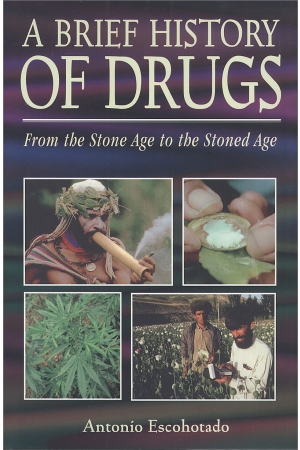- Pages: 176
- Book Size: 5.38 x 8.25
- ISBN-13: 9780892818266
- Imprint: Park Street Press
- On Sale Date: May 1, 1999
- Format: Paperback Book
• First American publication of the surprising European bestseller.
• Examines everything from the ancient use of ergot and datura to the modern phenomenon of "designer" drugs such as Ecstasy and crack cocaine.
From remotest antiquity to the present era of designer drugs and interdiction, drugs have played a prominent role in the cultural, spiritual, and social development of civilizations. Antonio Escohotado demonstrates how the history of drugs illuminates the history of humanity as he explores the long relationship between mankind and mind-altering substances. Hemp, for example, has been used in India since time immemorial to stimulate mental agility and sexual prowess. Aristotle's disciple Theophrastus testifies to the use of datura by the ancient Greeks and further evidence links the rites at Eleusis to the ingestion of a hallucinogen. Similar examples can be found in cultures as diverse as the Celts, the ancient Egyptians, the Aztecs, and other indigenous peoples around the world.
Professor Escohotado also looks at the present-day differences that exist between the more drug-tolerant societies like Holland and Switzerland and countries advocating complete repression of these substances. The author provides a comprehensive analysis of the enormous social costs of the drug war that is coming under increasing fire from all levels of society. Professor Escohotado's work demonstrates that drugs have always existed and been used by societies throughout the world and the contribution they have made to humanity's development has been enormous. The choice we face today is to teach people how to use them correctly or to continue to indiscriminately demonize them. "Just say no," the author says, is not an option. Just say "know" is.
Antonio Escohotado is a professor of philosophy and social science methodology at the National University of Distance Education in Madrid, Spain. He travels widely, offering lectures and seminars on the subject of drugs and history.
Preface
Introduction
1 Remote Antiquity
2 The Greek World
3 The Roman World
4 The End of Paganism
5 Islam and Inebriation
6 Drugs, Lust, and Satan
7 The Resurgence of Medicine
8 The Discovery of America
9 The End of the Old Regime and the Opium Wars
10 The Nineteenth Century
11 The Antiliberal Reaction
12 The Beginnings of the Crusade
13 New Drugs
14 A Pharmacratic Peace
15 The Psychedelic Rebellion
16 Return of the Repressed
17 The Era of Substitutes
18 Some Aspects of the Problem
Index
Ralph Metzner, Ph.D., author of The Unfolding Self and Green Psychology
"This book examines natural substances used by different cultures to alter the mind. Makes for interesting, thought provoking reading."
American Herb Association, Vol 16:4
“A fascinating and informative history of humankind’s checkered and often ambivalent relationship with psychoactive plants and drugs. From the role of the opium poppy in ancient Mesopotamia and the ergot-based mystery cult of Eleusis, through the opium wars in China and the persecution of medieval herbalist witches, up to the ‘psychedelic rebellion’ of the sixties and the insanities of the current ‘war on drugs,’ Escohotado covers an enormous subject with scholarly acumen and brings the light of reason to bear on topics often shrouded in bigotry, ignorance, and cupidity. Highly recommended!”
--Ralph Metzner, Ph.D., author of The Unfolding Self and Green Psychology
From remote antiquity to the present era of designer drugs and draconian interdiction, drugs have played a prominent role in the cultural, spiritual, and social development of civilizations. A Brief History of Drugs shows how the story of drugs illuminates the story of humanity, exploring the long relationship between human beings and mind-altering substances. Marijuana, for example, has been used in India since time immemorial to stimulate mental agility and sexual prowess, and a census in 312 c.e. revealed nearly 800 stores in the city of Rome devoted to selling opium. Similar examples can be found in cultures as diverse as the Celts, the ancient Egyptians, the Aztecs, and other peoples around the world.
Professor Escohotado also examines the present-day differences between drug tolerant societies like the Netherlands and Switzerland and countries advocating complete repression of these substances. He provides a comprehensive analysis of the enormous social costs of the drug war that is coming under increasing fire from all corners of society. Ultimately, A Brief History of Drugs demonstrates that drugs have been used by all societies, and the contribution they have made to humanity’s development has been enormous. The task we face today is to better understand them, instead of continuing to indiscriminately demonize them. “Just say no,” says Escohotado, is not an option. Just say “know” is.
ANTONIO ESCOHOTADO is a professor of philosophy and social science methodology at the National University of Distance Education in Madrid, Spain. He travels widely, offering lectures and seminars on the subject of drugs and history.



